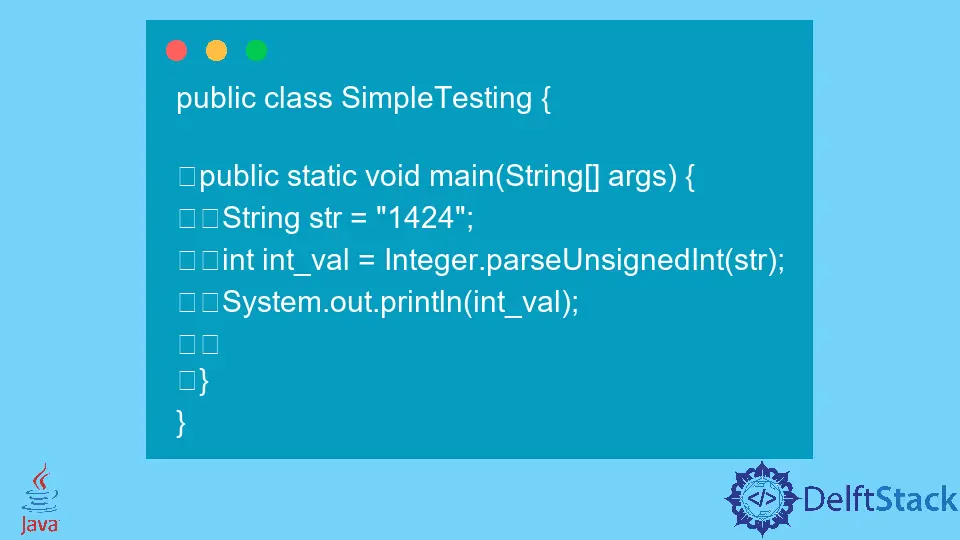How to Convert a String to an Int in Java
-
Convert a
Stringto anintUsingparseInt()in Java -
Convert
Stringto anintUsingApachein Java -
Convert
Stringto anintUsingdecode()in Java -
Convert
Stringto anintUsingvalueOf()in Java -
Convert
Stringto anintUsingparseUnsignedInt()in Java -
Convert
StringAfter Removing Non-Numeric Chars UsingreplaceAll()in Java

This tutorial introduces how to convert a String to an int in Java and lists some example codes to understand it.
Convert a String to an int Using parseInt() in Java
Both String and int are data types in Java. The String is used to store textual information while int is used to store numerical data.
Here, we use the parseInt() method of the Integer class that returns an integer. Since Java does implicit auto-boxing, then we can store it into int primitive type. See the example below.
public class SimpleTesting {
public static void main(String[] args) {
String str = "1234";
int int_val = Integer.parseInt(str);
System.out.println(int_val);
}
}
Output:
1234
Convert String to an int Using Apache in Java
If you are working with the Apache library, you can use the toInt() method of NumberUtils class that returns an int value. If the passed string contains any non-numeric char, this method does not throw any exception, but returns 0. It is safe to use toInt() rather than parseInt() which throws NumberFormatException. See the example below.
import org.apache.commons.lang3.math.NumberUtils;
public class SimpleTesting {
public static void main(String[] args) {
String str = "1234";
int int_val = NumberUtils.toInt(str);
System.out.println(int_val);
str = "1234x"; // non-numeric string
int_val = NumberUtils.toInt(str);
System.out.println(int_val);
}
}
Output:
1234
0
Convert String to an int Using decode() in Java
We can use the decode() method of the Integer class to get int value from a string. It returns Integer value, but if you want to get int (primitive) value then use intValue() with decode() method. See the example below.
public class SimpleTesting {
public static void main(String[] args) {
String str = "1424";
int int_val = Integer.decode(str);
System.out.println(int_val);
// int primitive
int_val = Integer.decode(str).intValue();
System.out.println(int_val);
}
}
Output:
1424
1424
Convert String to an int Using valueOf() in Java
We can use the valueOf() method to get an int value of a string after conversion.
public class SimpleTesting {
public static void main(String[] args) {
String str = "1424";
int int_val = Integer.valueOf(str);
System.out.println(int_val);
}
}
1424
1424
Convert String to an int Using parseUnsignedInt() in Java
If we want to convert a string that does not include a sign, use the parseUnsignedInt() method to get int value. It works fine with unsigned string value and throws an exception if the value is signed.
public class SimpleTesting {
public static void main(String[] args) {
String str = "1424";
int int_val = Integer.parseUnsignedInt(str);
System.out.println(int_val);
}
}
Output:
1424
Convert String After Removing Non-Numeric Chars Using replaceAll() in Java
If the string contains non-numeric chars, use the replaceAll() method of String class with regex to remove all the non-numeric chars and then use the parseInt() method of Integer class to get its equivalent integer value. See the example below.
public class SimpleTesting {
public static void main(String[] args) {
String str = "1424x";
str = str.replaceAll("[^\\d]", "");
int int_val = Integer.parseInt(str);
System.out.println(int_val);
}
}
Output:
1424
Related Article - Java String
- How to Perform String to String Array Conversion in Java
- How to Remove Substring From String in Java
- How to Convert Byte Array in Hex String in Java
- How to Convert Java String Into Byte
- How to Generate Random String in Java
- The Swap Method in Java